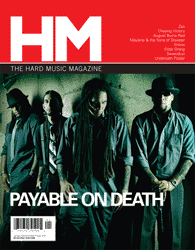HM (magazine)
Christian hard rock magazine From Wikipedia, the free encyclopedia
HM Magazine is a monthly, digital and print on demand publication focusing on hard music and alternative culture of interest to Christians. It is based in Houston, Texas.[1] Originally published as Heaven's Metal, it was renamed to HM in 1995, and in late 2004 Heaven's Metal was reissued as a separate publication from HM, with some shared editorial overlap.
 HM Magazine, Issue #117 featuring P.O.D., January/February 2006 | |
| Editor | David Stagg |
|---|---|
| Categories | Christian metal |
| Frequency | Monthly |
| Publisher | David Stagg |
| Founder | Doug Van Pelt |
| First issue | Summer 1985 |
| Final issue | 2011 (print) |
| Company | HM Publications LLC |
| Country | United States |
| Based in | Houston, Texas |
| Language | American English |
| Website | hmmagazine |
| ISSN | 1066-6923 |
History
Summarize
Perspective

In 1985, a journalist Doug Van Pelt started Heaven's Metal as a fanzine. It changed its name in 1995 to HM, standing for Hard Music, but the Heaven's Metal branding was brought back in 2004 and was released alongside HM.[2][3] Heaven's Metal achieved more popularity and became an official publication, with five full-time journalists working for the magazine. In 2000, HM achieved a regular subscription base of 15,000 readers.[4]
During the 1990s, HM sealed a distribution deal with a major magazine wholesaler that immediately increased its print-run from 13,000 to 22,000 copies, and it allowed Van Pelt and his co-workers to double ad rates, making HM a stable business enterprise.[4] The most popular issue of the publication was No. 77 (May/June 1999), where Doug Pinnick of King's X came out as homosexual.[4] A subsequent wave of Christian music retailers refusing to sell the music of King's X is attributed to the publicizing of Pinnick's sexuality in that HM issue.[4]
In 2010, Heaven's Metal ceased print and its content was merged into the digital issues of HM.[5] In February 2013, Van Pelt sold HM to current editor David Stagg.[6] Van Pelt remains the owner and publisher of Heaven's Metal, which is officially a separate publication even though it shares some editorial coverage with HM.[7][8]
References
External links
Wikiwand - on
Seamless Wikipedia browsing. On steroids.
